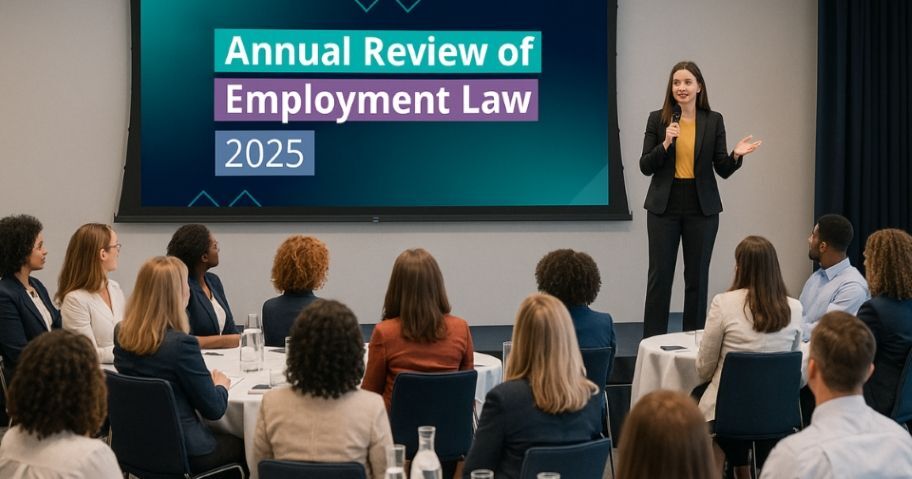
Christine, Julie, and Laura - known as the Knowledge Team - bring extensive expertise in employment law, HR, and learning & development. With diverse backgrounds spanning top-tier law firms, in-house roles, and voluntary organisations across the UK and Ireland, they provide informed and strategic support on employment matters.
Our team includes qualified (now non-practising) employment solicitors with experience in both legal and corporate sectors, alongside an experienced HR professional and CIPD Associate Member, ensuring a well-rounded approach to workplace challenges.
Wish we could send employment law updates on Westlife stamps… but for now, it’s inbox delivery only. Happy reading.
Top 5 Reads for Busy People:
- AI is shaking up employment law 🤖
- Labour Court delays: Deputy chairman roadblock sparks major delays ⏳
- New employment legislation is coming 📜
- High Court twist: “Without prejudice” letters now in evidence ⚖️
- Workers sidelined: ICTU slams Government plan for ignoring staff 🚨
And in other news… back-to-back Zoom marathons, AI worries, and endless bureaucracy are turning the home office into a stress office! Read more here.
**Please note that a small number of people are experiencing some issues with our website, which may have impacted your view of the Friday Round-Up. If this is the case, please hold down Ctrl, Shift and the 'R' key. Hopefully this resolves any technical issues and you can view the full Friday-Round-Up. We apologise for any inconvenience in this regard.**
CONTENTS ⚓︎
- Case Law Reviews
- Annual Review Session of the Week - Hybrid Still Isn’t Working – Here’s How HR Can Fix It
- AI and Employment Law
- Impact on Labour Court Hearings
- Employment Status
- Legislation
- Education and Employment Law
- Industrial Action
- Action Plan on Competitiveness and Productivity
- Just In Case You Missed It....
- HR Developments
- Employment News in the Media
- Health and Safety Developments
- Free Webinars This Month
1. Case Law Reviews ⚓︎
Maxmilliam Azuikeokafor v Accenture Limited ADJ-00052307
Summary: WRC held the employee’s discrimination and harassment claim against Accenture was out of time under the Employment Equality Acts and therefore statute-barred.
Practical Guidance for Employers:
- This case highlights the importance of understanding statutory time limits for discrimination complaints. Employers should note that claims must generally be brought within six months of the last alleged incident, extendable to twelve months only for “reasonable cause”.
- Maintaining clear, dated records of incidents, investigations, and communications are important in defending claims and showing no discriminatory conduct. Where grievances are raised, employers should investigate promptly and document outcomes to prevent later assertions of neglect.
- Finally, ensure employees are informed of internal grievance procedures and statutory rights, reducing the risk of claims being escalated outside the permitted timeframe(s).
Read the full Review here: Maxmilliam Azuikeokafor v Accenture Limited [2025]
Derek Lynch v Alliance Automotive Group Ireland Limited ADJ-00056420
Summary: WRC held that the employee’s request for 3 days’ Force Majeure leave did not meet the statutory test, as his wife was already under hospital care, and the complaint was not well founded.
Practical Guidance for Employers:
Employers should:
- Approach requests for Force Majeure leave with careful reference to the statutory test. Namely, the employee’s presence must be urgent, unforeseeable, and indispensable. The entitlement is assessed day by day, not as a block of time, and only applies when all three conditions are met.
- Show sensitivity and flexibility in dealing with employees facing family emergencies. Even where Force Majeure leave is not legally applicable, alternatives such as annual leave, carer’s leave, or unpaid leave should be explored promptly.
- Explain decisions in writing with reference to the statutory criteria, and employees should be reminded of other supports available (e.g. Employee Assistance Programmes).
Read the full Review here: Derek Lynch v Alliance Automotive Group Ireland Limited [2025]
These case reviews were written by Patrick Barrett BL.
Patrick's legal education is robust, beginning with a BCL Law Degree from University College Cork (2012-2016), followed by an LL.M in Business Law from the same institution (2016-2017), and culminating in a Barrister-at-Law Degree from The Honorable Society of King’s Inns in Dublin (2019-2021). He has extensive experience on the South-West Circuit, handling Civil, Family, and Criminal Law cases, as well as advising the Citizen Advice Service. He has worked as an employment consultant, dealing with workplace investigations and bankruptcy procedures.
Remember: Our Irish case law reviews are now held in our case law section on our fully-searchable employment law hub website.
2. Annual Review Session of the Week ⚓︎
Hybrid Still Isn’t Working – Here’s How HR Can Fix It
Hybrid work is here to stay but it is still creating headaches for employers. From managing clashing expectations to tackling digital fatigue and staying compliant, HR is under pressure to get it right. Join Caroline Reidy, MD, HR Suite at the Annual Review of Employment Law for practical strategies and insider tips to turn hybrid working into a real competitive advantage. View the full programme here and book your spot today.
3. AI & Employment Law ⚓︎
Opinion: Ireland officially loneliest country in the EU. Might AI friends help?
Recent tragic cases in the US of teenagers taking their life after emotional conversations with chatbots showed that the inevitable rise of AI ‘friends’ will need proper guardrails. More from Silicon Republic.
AI on the job: How AI is re-shaping employment law
The use of AI in everyday life has become increasingly prominent. In the workplace, AI holds the potential to fundamentally transform HR practices and workforce management. To avoid infringing on employment rights and to ensure compliance, it is essential to establish robust governance and oversight mechanisms. William Fry provides more guidance here.
EU AI Act Update: Ireland appoints its national competent authorities
On 25 July 2025, the Minister for Enterprise, Tourism and Employment in Ireland issued the European Union (Artificial Intelligence) (Designation) Regulations 2025 (the “Designation Regulations”) to give further effect to the EU Artificial Intelligence Act (Regulation (EU) 2024/1689) (the “AI Act”). Bird & Bird have set out the national comeptent authorities for Ireland here.
OpenAI to launch jobs platform linking employers and AI experts
The ChatGPT maker wants the new platform to match employers with workers who have the AI skills they need. OpenAI has announced plans to develop a platform to introduce employers to job hunters with skills in AI, as a means of improving AI fluency and increasing the use of modern technologies across companies and government departments. It will be called the OpenAI Jobs Platform and it is expected to launch in mid-2026. Read all about it in Silicon Republic here.
HR or HR plus Chief AI Enablement Officer?
This week Barry Phillips considers the evolving shape of HR in the fast moving world of AI.
You can also access the episode here.
4. Impact on Labour Court Hearings ⚓︎
Labour Court warns of severe delays after reappointment of deputy chairman blocked
The Labour Court has been reduced to one operating division after the renewal of a serving deputy chairman’s warrant of appointment was blocked by the Department of Public Expenditure Infrastructure Public Service Reform and Digitalisation.
The Labour Court is a statutorily independent judicial body but is funded by the Exchequer from funding allocated through the Department of Enterprise, Tourism and Employment and ultimately approved by the Department of Public Expenditure Infrastructure Public Service Reform and Digitalisation.
From this week, this means that the Labour Court will be reduced to one operating division. This unexpected development will have a “severe impact” on the functioning of the court, it said in a statement.
More from Irish Legal News here.
5. Employment Status ⚓︎
From contractors to employees: tax and employment law risks for Irish sporting bodies
Determining employment status has been a matter of contention in recent times for Irish organisations, particularly following the Supreme Court's judgment in The Revenue Commissioners v Karshan Midlands t/a Domino's Pizza case.
It has also become a prevalent issue in international sports. A UK Supreme Court decision has considered whether part-time football referees should be classified as employees or contractors for tax purposes. This ruling may influence the approach taken by Irish sports organisations. Media reports suggest that the Irish Revenue Commissioners (Revenue) is carrying out tax audits with GAA county boards regarding the tax status of payments to referees, players, Cúl Camp coaches and other officials. Read Ogier's insights here.
Back to Top
6. Legislation ⚓︎
Tip of the Week: Employers – New and proposed legislation keeps on coming - legislative developments to be mindful of
Irish employment law is well known for its extensive statutory regulation, and new changes are occurring all the time. Here are three key developments that employers should be aware of, both in terms of immediate obligations and potential future expansions to employee entitlements in the medium to longer term.
Fieldfisher tell us about three key changes, including:
- Gender Pay Gap Reporting Expansion
- Proposed Statutory Leave for Pregnancy Loss
- New Protected Ground: Socio-Economic Disadvantage
More here.
7. Education & Employment Law ⚓︎
School Cleared of Victimisation Allegation in WRC Case
The WRC has dismissed a complaint that a teacher was discriminated against in an interview and during their employment because of an ongoing WRC claim against a separate school. The teacher alleged that she was victimised during the course of the respondent school’s recruitment process. She claimed that this was because of an action she had taken to the WRC against another school under the Employment Equality Act. She alleged that this discrimination took the form of unequal terms and conditions of employment. Additionally, she was not successful in being employed on the school’s supply panel, which she had been working on successfully for almost two years. While the WRC ruled that proceedings against a third party could be deemed a protected act, the teacher failed to show that she was being victimised against in the first instance.
Read Mason Hayes & Curran's update here.
Frustration of Contract in Schools
A recent decision of the WRC has reaffirmed the Irish legal position on the doctrine of frustration regarding employment law. The case involved a special needs assistant who failed to present for work over the course of a four month period without prior approval from his employer. The WRC decided that this conduct amounted to an act which frustrated his contract of employment. This ruling is both a helpful restatement of the principles underlining the doctrine of frustration for employers as well as a clarification for educational institutions on the discretion they’re afforded in deciding on career breaks.
Learn more from Mason Hayes & Curran here.
WRC Upholds Teacher’s Dismissal on Grounds of Professional Competence
The WRC has affirmed a school’s dismissal of a teacher on professional competence grounds. This decision is one of the first WRC cases addressing a competence-based dismissal relating to teachers.
Read more here.
8. Industrial Action ⚓︎
Opening round of WRC talks over school workers conclude
Talks at the WRC on access to pensions for school secretaries and caretakers have concluded and will resume at a future date. The dispute saw more than 2,600 school staff, who are members of the Fórsa trade union, engage in strike action for more than a week impacting around 2,000 schools. Fórsa withdrew the strike action on Friday night after an agreement was reached to engage in a process to resolve the dispute. RTÉ has the full story.
Planned industrial action at Dublin Fire Brigade deferred
Planned industrial action by SIPTU members in Dublin Fire Brigade, which was due to begin today, has been deferred to allow for talks. The dispute relates to safety concerns over the introduction of a new call-out and dispatch system. SIPTU had accused the Department of Housing, Local Government and Heritage of attempting to impose the new Computer Aided Dispatch system without consultation. RTÉ has the full story.
9. Action Plan on Competitiveness and Productivity ⚓︎
The Action Plan on Competitiveness and Productivity – a commitment in the Programme for Government – is a critical government policy which focuses on the economic areas that fall within our domestic sphere of influence.
In light of the rapidly evolving global landscape, and given the changing international economic and trading environment, government decided to accelerate the delivery of the action plan and expedite its preparation and publication. This whole-of-government plan is the strategic response to the challenges that Ireland is facing.
The action plan contains 85 actions for enhancing our competitiveness and productivity performance, with 26 of these identified as priority actions. Actions are set out across six themes:
• embracing research, innovation and skills
• boosting FDI and exports and influencing at EU level
• creating and scaling more SMEs
• regulating for growth and controlling costs
• increasing the state’s capacity to deliver infrastructure
• growing sustainable Irish businesses and boosting regional development
Read the government’s press release here.
The ICTU reports that the Government’s Competitiveness plan leaves workers as an afterthought…..
More on that here.
And Ibec calls for funding to be found for new Action Plan on Competitiveness and Productivity
Ibec has welcomed the Government's new Action Plan on Competitiveness and Productivity aimed at increasing Ireland's international competitiveness and resilience. The business group described the plan as "very positive and important step in future-proofing Ireland’s economic model in a time of global change". But said the funding needed to be put in place in the Budget to "provide the necessary resources to underpin the ambitions laid out in the plan". Business Plus has the full story.
Back to Top
10. Just In Case You Missed It...... ⚓︎
Q&A: Auto-Enrolment and My Future Fund
In this month's Q&A, Jason McMenamin, Associate in A&L Goodbody's Employment Group, provides an update on key features of auto-enrolment and the Automatic Enrolment Retirement Savings System Act 2024 (the AE Act).
More on our Hub here.
We have a number of articles on Auto Enrolment available on our hub, such as:
Auto Enrolment Pension Q&A written by Roisin Boyle, SIPTU
Auto-Enrolment Explained: Preparing Your Organisation for Ireland’s New Pension Scheme written by Caroline Reidy, HR Suite
You can also explore more resources in our Topic A–Z, under Pensions & Retirement.
Collective redundancies in an insolvency situation
In Ireland there have been long-standing challenges with Irish collective redundancy legislation, particularly where businesses are in financial distress. These challenges were highlighted in high profile cases involving the retail sector where stores were closed with limited or no engagement with employee representatives.
In this article Philip Gray of Addleshaw Goddard looks at some significant developments that have occurred over the past 12 months that HR advisors and Insolvency Practitioners alike should be aware of when dealing with possible collective redundancies in an insolvency situation. More on the Hub.
11. HR Developments ⚓︎
Endless Meetings, AI Anxiety, and Bureaucracy: The New World of Work
With working from home now widespread, employees often find themselves on video calls for much of the day — sometimes up to eight hours on Teams or Zoom. What once took a quick desk chat is now replaced by back-to-back online meetings, leaving little space to think. Added to this is the isolation of working alone, with fewer opportunities for casual face-to-face connection. Read more about this by Peter Cosgrove, MD of Futurewise Ltd. here.
Talent coaching: How to develop and retain high performers
72% of organisations say coaching drives employee engagement. But despite this clear link, many still treat coaching as a nice-to-have – not the strategic advantage it is. Most companies say they want to develop their people. But when it comes to real investment, coaching often gets sidelined – reserved for senior leaders, high-stakes moments, or performance issues. High-performing organisations take a different approach. For them, talent coaching isn’t a perk – it’s part of the plan.
HRD Connect has more.
12. Employment News in the Media
The High Court has dismissed proceedings brought by a serial litigant against the Courts Service of Ireland and has granted an Isaac Wunder order against him. Delivering judgment for the High Court, Mr Justice David Nolan determined that the plaintiff’s proceedings were frivolous, vexatious and an abuse of process, remarking that “Mr Nowak has gone to every court in the land, but has failed.” The plaintiff, a former student of the Institute of Chartered Accountants in Ireland, was employed by PwC from 2006 to 2009. His training contract was terminated due to a failure to pass certain accounting exams in 2009, causing him to issue proceedings in which he successfully his dismissal. Irish Legal News has more.
The High Court has admitted into evidence letters entitled “without prejudice save as to costs” in circumstances where they contained implicit threats designed to place improper pressure on the defendant to settle the proceedings. The plaintiff asserted inter alia that the defendant acted in breach of a shareholder’s agreement, solicited its employees to work for RunTime Machines AG and copied its technology, a blockchain solution known as “1LDT”. The plaintiff alleged that it sustained losses of €106,666,667. Irish Legal News has more.
An academic who claimed she was unfairly turned down for a promotion because assessors "ignored" the impact of past discrimination on her career trajectory has failed in an equality claim against the University of Galway. In a decision published this week, the Workplace Relations Commission (WRC) has rejected a complaint under the Employment Equality Act 1998 brought by Mary Dempsey, an assistant professor at the university's engineering department. More from RTE.
An order of missionary nuns has been ordered to pay €2,040 compensation for the unfair dismissal of a care home worker after she claimed that her Supervisor told her "if you walk out that door, your job is gone". At the Workplace Relations Commission (WRC), Adjudicator Gaye Cunningham has ordered the Missionary Sisters of St. Columban to pay Jessica Tyrrell Browne €2,040 for her unfair dismissal following an incident at work on July 8, 2024. RTE has more.
A salesman from the Travelling Community who was left "disheartened" and quit after he said he overheard the managing director of his new job making remarks about 'pikeys' and ‘tinkers’ has secured €7,500 in compensation for discrimination in the workplace. The Workplace Relations Commission (WRC) made the award to the worker, Raymond Nevin, after finding that there was a "culture and tolerance" of the use of such "derogatory terminology" towards Travellers at CPF (Profiles) Ltd in Longford. Learn more here.
Gregg Wallace has launched legal action against the BBC after his dismissal from MasterChef, according to filings with the High Court. He was sacked from the long-running programme in July after an inquiry into allegations of inappropriate conduct on set. The inquiry, commissioned by production company Banijay, upheld 45 allegations against the presenter. More from Personnel Today.
13. Health and Safety Developments ⚓︎
Worker dismissed for making complaint to HSA over no work washroom facilities
A retail worker was dismissed by a Dublin based franchise operator of fashion retailer YaYa after making a complaint to the Health and Safety Authority (HSA) concerning the lack of washroom facilities in the workplace. At the Workplace Relations Commission, Adjudicator Penelope McGrath has ordered GB Agencies Galway Limited, trading as YaYa, to pay compensation of €7,500 to Fiona Bird for being penalised under Section 28 of the Safety, Health and Welfare at Work Act 2005.
RTÉ has more.
14. Free Webinars This Month
Auto-Enrolment 2025 - What HR Needs to Know and Do
📅 Thursday, 18 September 2025
⏰ 11:00 – 11:45 (45 mins)
💻 Online
Ireland’s new auto-enrolment scheme is going live, and for HR teams, that means real changes to contracts, payroll, and how you communicate with staff. Yet, as RTÉ recently reported, 1 in 4 organisations still haven’t begun preparing.
So, ask yourself: is your organisation ready? Or just hoping it all falls into place?
Whether you're well underway or just getting started, this short, focused webinar will help you:
- Understand your obligations and what’s changing
- Spot potential payroll and contract pitfalls
- Sense-check your approach with expert insight
- Hear how other employers are planning their response
Led by Caroline Reidy, MD of the HR Suite and one of Ireland’s most respected HR experts, the session will offer clear, practical guidance. Hosting the conversation is Julie Holmes from Legal Island, who’ll ask the questions that matter, including how to talk about pensions without everyone leaving the room.
You’ll leave with fresh insight, real-world examples, and the confidence to take the next step, whether you’re already well-positioned or still catching up.
Check out previous discussions:
Legal Island's Webinar & Podcasts
Enjoy your weekend!
Legal Island
Continue reading
We help hundreds of people like you understand how the latest changes in employment law impact your business.
Please log in to view the full article.
What you'll get:
- Help understand the ramifications of each important case from NI, GB and Europe
- Ensure your organisation's policies and procedures are fully compliant with NI law
- 24/7 access to all the content in the Legal Island Vault for research case law and HR issues
- Receive free preliminary advice on workplace issues from the employment team
Already a subscriber? Log in now or start a free trial
 FREE WEBINAR: Auto-Enrolment 2025 - What HR Needs to Know and Do
FREE WEBINAR: Auto-Enrolment 2025 - What HR Needs to Know and Do

